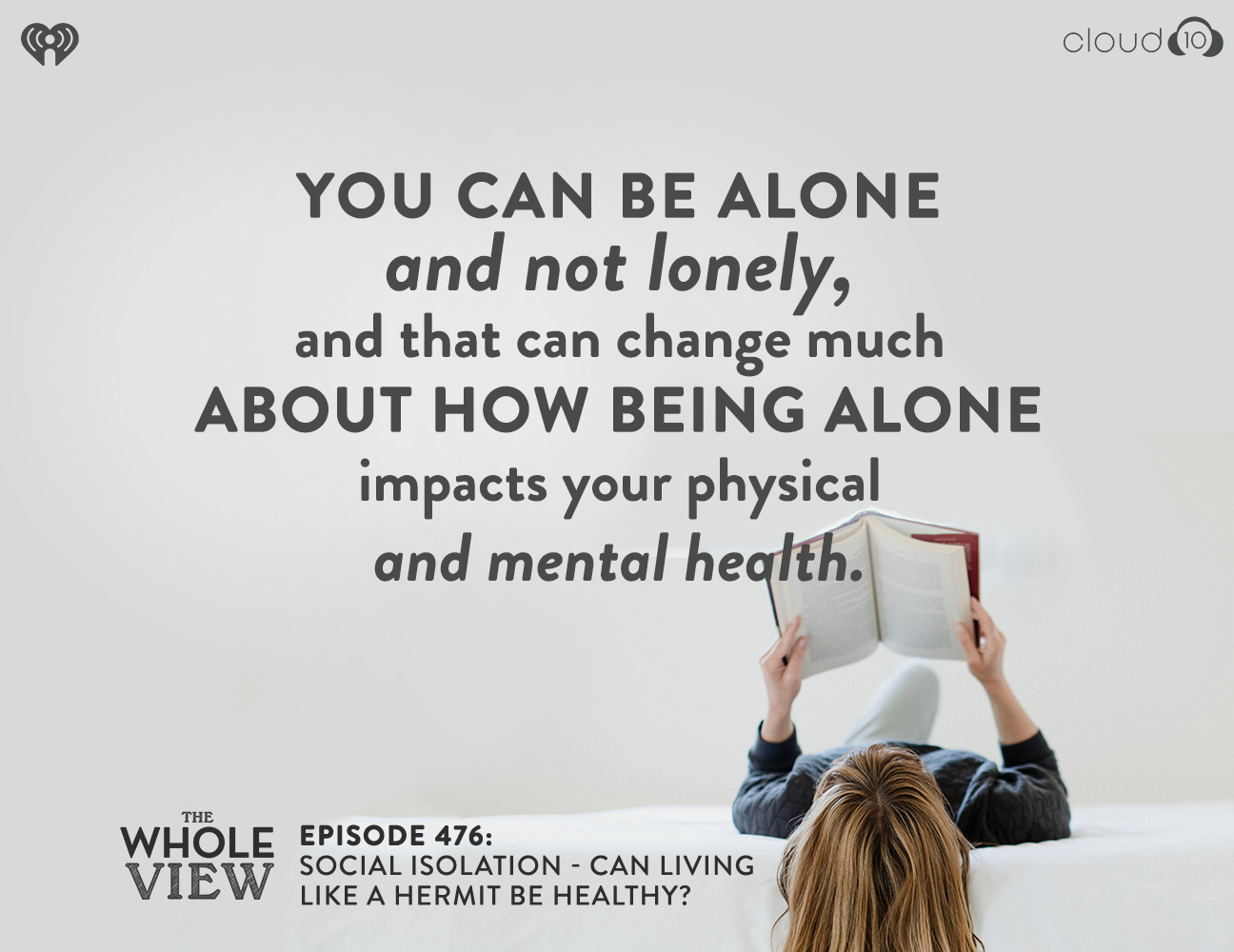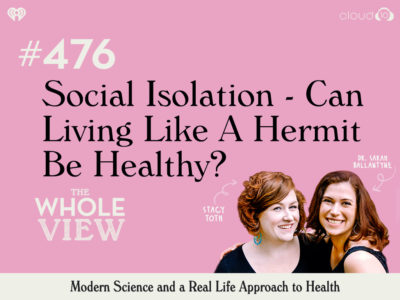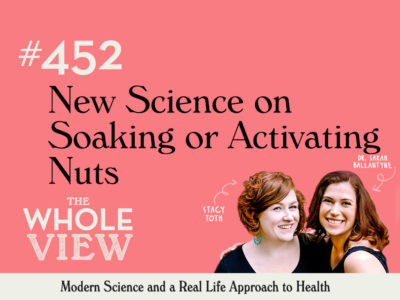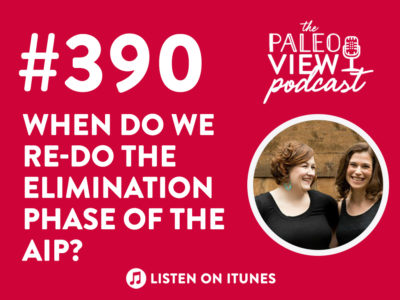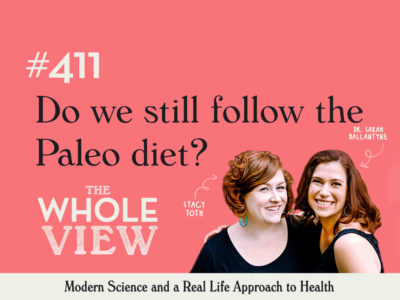On this episode of The Whole View, Stacy and I answer a question from Charissa, who asks if there are negative health effects to living alone. Science does show that social isolation and loneliness corresponds to an increased risk of morbidity and mortality, and conversely, a strong social support network decreases risk of disease. It is important to note: the feeling of social connection is subjective, and what matters is whether you feel connected, not how many friends you have or how often you see them.
Table of Contents[Hide][Show]
While the science shows that social connection does improve our health, it is important to stress that feeling safe is also imperative for health and wellness (as per Maslow’s Pyramid!). So if we are living a more isolated lifestyle through the pandemic, we need to give ourselves the grace and permission to do what feels comfortable. Physical touch is another important component of social connectedness and comes with its own set of health benefits. In summary, we conclude that a hermit isn’t automatically healthy, but they can be! And while solitary living does increase health risks, there are many things that can offset that including companion pets, digital connection, physical activity, a Nutrivore diet, and a healthy work-life balance!
If you enjoy the show, please review it on iTunes!
Recommended Reading and Listening
- The Health Benefits of Connection
- TWV Episode 456: Foster Care and Mental Health Awareness.
- TWV Episode 458: Collective Trauma and Re-Entry Anxiety.
- TPV Podcast Episode 382: Social Media.
- TWV Podcast Episode 402: The Benefits of Pets (and Sarah’s getting a puppy!).
Citations
Lennartsson C, Rehnberg J, Dahlberg L. The association between loneliness, social isolation and all-cause mortality in a nationally representative sample of older women and men. Aging Ment Health. 2021 Sep 22:1-8. doi: 10.1080/13607863.2021.1976723. Epub ahead of print. PMID: 34550832.
Lara E, Martín-María N, De la Torre-Luque A, Koyanagi A, Vancampfort D, Izquierdo A, Miret M. Does loneliness contribute to mild cognitive impairment and dementia? A systematic review and meta-analysis of longitudinal studies. Ageing Res Rev. 2019 Jul;52:7-16. doi: 10.1016/j.arr.2019.03.002. Epub 2019 Mar 23. PMID: 30914351.
Pressman SD, Cohen S, Miller GE, Barkin A, Rabin BS, Treanor JJ. Loneliness, social network size, and immune response to influenza vaccination in college freshmen. Health Psychol. 2005 May;24(3):297-306. doi: 10.1037/0278-6133.24.3.297. Erratum in: Health Psychol. 2005 Jul;24(4):348. PMID: 15898866.
Cohen S, Doyle WJ, Skoner DP, Rabin BS, Gwaltney JM Jr. Social ties and susceptibility to the common cold. JAMA. 1997 Jun 25;277(24):1940-4. PMID: 9200634.
Valtorta NK, Kanaan M, Gilbody S, Ronzi S, Hanratty B. Loneliness and social isolation as risk factors for coronary heart disease and stroke: systematic review and meta-analysis of longitudinal observational studies. Heart. 2016 Jul 1;102(13):1009-16. doi: 10.1136/heartjnl-2015-308790. Epub 2016 Apr 18. PMID: 27091846; PMCID: PMC4941172.
Xia N, Li H. Loneliness, Social Isolation, and Cardiovascular Health. Antioxid Redox Signal. 2018 Mar 20;28(9):837-851. doi: 10.1089/ars.2017.7312. Epub 2017 Oct 23. PMID: 28903579; PMCID: PMC5831910.
Holt-Lunstad J, Smith TB, Baker M, Harris T, Stephenson D. Loneliness and social isolation as risk factors for mortality: a meta-analytic review. Perspect Psychol Sci. 2015 Mar;10(2):227-37. doi: 10.1177/1745691614568352. PMID: 25910392.
Save 70% Off the AIP Lecture Series!
Learn everything you need to know about the Autoimmune Protocol to regain your health!
I am loving this AIP course and all the information I am receiving. The amount of work you have put into this is amazing and greatly, GREATLY, appreciated. Thank you so much. Taking this course gives me the knowledge I need to understand why my body is doing what it is doing and reinforces my determination to continue along this dietary path to heal it. Invaluable!
Carmen Maier
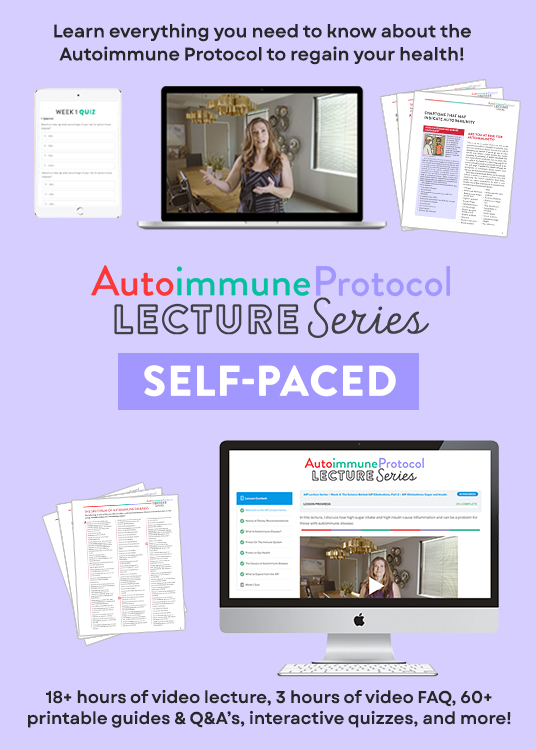
Djundeva M, Dykstra PA, Fokkema T. Is Living Alone “Aging Alone”? Solitary Living, Network Types, and Well-Being. J Gerontol B Psychol Sci Soc Sci. 2019 Oct 4;74(8):1406-1415. doi: 10.1093/geronb/gby119. PMID: 30312447; PMCID: PMC6777768.
May 2021 American Perspectives Survey
Sahi RS, Schwyck ME, Parkinson C, Eisenberger NI. Having more virtual interaction partners during COVID-19 physical distancing measures may benefit mental health. Sci Rep. 2021 Sep 14;11(1):18273. doi: 10.1038/s41598-021-97421-1. PMID: 34521876; PMCID: PMC8440653.
